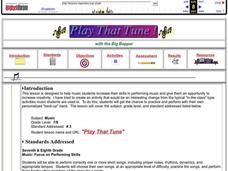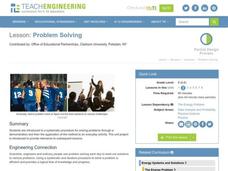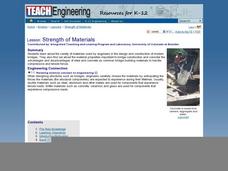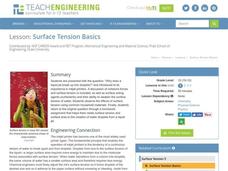Teach Engineering
Six Minutes of Terror
Help your class understand the design challenges when trying to land a remote spacecraft on a planet. Class members examine the provided information to understand how each component of a spacecraft is designed in order to safely land a...
Curated OER
Ocean Life
Mini-marine biologists use Scholastic Explorers website to learn about declining numbers of leatherback sea turtles and dusky dolphins. They fill out a K-W-L chart and observation journal worksheet, which are both provided in the lesson...
Teach Engineering
Photosynthesis—Life's Primary Energy Source
Wouldn't it be great if you could produce your own food? Scholars learn about the processes of photosynthesis and cellular respiration in plants. They consider how to use photosynthesis as a model of an efficient system and how to apply...
Teach Engineering
Concentrated Solar Power
The seventh segment in an eight-part unit promotes the idea of concentrating the sun to increase the power of a photovoltaic panel. Pupils learn about devices used such as reflectors or lenses.
Teach Engineering
Airplanes Everywhere: Land! Water! Sky! Oh, My!
How important is aviation? Using the background information, teachers provide the class with a brief history of aviation. The class discusses how airplanes are important to the area of transportation in the 17th installment of a...
Curated OER
Name That Tune
Integrating technology and music can be a snap with lessons like this one! Kids in a junior high band class took to the Internet to download and practice playing their instrument with a computer generated back up band. They practice...
Teach Engineering
Stormy Skies
Young meteorologists examine the four main types of weather fronts and how they appear on a weather map. Participants learn about the difference between the types of weather fronts along with their distinguishing features. A...
Teach Engineering
Viscous Fluids
Elasticity and viscosity. Help your class understand the similarities and differences with an introduction to viscous fluids. After describing four types of fluid behaviors: shear thinning, shear thickening, Bringham plastic, and...
Teach Engineering
What Does Light See?
The second installment of a seven-part series focuses on the refraction of light and how it affects the colors we see. Learners consider how this concept connects to biosensors for cancer detection.
Teach Engineering
Common and Natural Logarithms and Solving Equations
Log some practice with logarithms. A PowerPoint presentation provides a tutorial on the change of base formula involving natural logarithms and solving exponential equations with logarithms in the fourth installment of a seven-part...
Teach Engineering
The Building Blocks of Matter
Everything can be reduced to atoms. The first installment of a six-part Mixtures and Solutions unit focuses on the building blocks of matter. Scholars review basic atomic structure, including protons, neutrons, and electrons, in...
Teach Engineering
Energy Resources and Systems
We've talked a lot about energy, but where does energy come from? Pupils brainstorm different energy sources through a class discussion to kick off the 14th installment of a 25-part Energy Systems and Solutions unit. They then research...
Teach Engineering
Restriction Enzymes and DNA Fingerprinting
Show your class why restrictions aren't always a bad thing. In the third segment of a four-part series, the instructor develops the idea of restriction enzymes. Pupils learn how scientists use restriction enzymes in DNA analysis and DNA...
EngageNY
Researching Digital Sources, Part 1: Guided WebQuest
We are living in a technical world. Scholars learn how to examine digital resources for their research on DDT. They explore a list of websites using a Digital Resources on DDT sheet. Learners examine their research notebook to determine...
Teach Engineering
May the Force Be with You: Weight
Too much material will weigh you down. The sixth segment in a series of 22 highlights how weight affects a plane. Pupils learn that engineers take the properties of materials, including weight, when designing something.
Teach Engineering
Properties of Mixtures vs. Solutions: Mix It Up!
Now it becomes crystal clear why the unit is called Mixtures and Solutions. The fifth installment of a six-part unit explores mixtures and solutions. After viewing a demonstration on mixing pebbles with water, salt with water, and...
Teach Engineering
Problem Solving
Need a activity? Problem solved. Scholars learn about the problem-solving process in the sixth installment of a 25-part Energy Systems and Solutions unit. The particular process in question is the Technological Method of Problem Solving.
Teach Engineering
Strength of Materials
Pupils examine a stress-strain diagram that compares the advantages and disadvantages of the two common bridge building materials, concrete and steel. The also consider the factors that influence the materials builders choose for their...
Teach Engineering
Bridging the Gaps
The London Bridge should not have fallen down. And here's why. After a brief history of bridges and the three main types, class members are introduce to the concepts of tension and compression, the two main forces acting upon bridges.
Teach Engineering
Applications of Linear Functions
It's not so straightforward — lines can model a variety of applications. Pupils experience linear relationships within the context of science, including Hooke's and Ohm's Laws. Class members got a taste of motion and speed from the...
Teach Engineering
Statistical Analysis of Flexible Circuits
Scholars connect statistical analysis with flexible electric circuits. They first learn about flexible circuits and their applications through a PowerPoint presentation and then consider how the fabrication process for these circuits...
Teach Engineering
Exploring Energy: Kinetic and Potential
The potential of the energy in the class is moving. The third segment in a six-part unit on energy provides a deeper understanding of kinetic and potential energy. Learners understand the relationship between mass, speed, and energy and...
Teach Engineering
Exploring Energy: Energy Conversion
The energy is not really lost, it is just converted to a different form. Pupils learn about the conversion of energy in the fifth segment of an energy unit with six parts. Learners develop an understanding of the conservation of energy...
Teach Engineering
Surface Tension Basics
Back to the basics (of surface tension). The first installment of a nine-part series teaches young scholars about the basics of surface tension and how it relates to water droplets. They also learn how this concept allows for the...

























